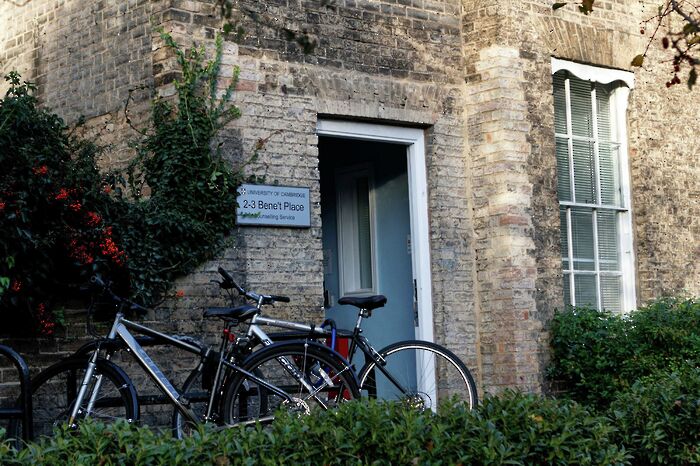We shouldn’t wait for coping to become struggling before acting to improve mental health
Cait Findlay discusses the people who are often left out of discussions about mental health at Cambridge: those who appear to be ‘coping’

Over the last few weeks, the University has been holding discussions on its mental health and wellbeing strategy. In my time at Cambridge, I’ve noticed that the discourse around mental health among students and staff focuses on a dichotomy of ‘struggling’ and ‘coping’ as if these are two discrete states of being, rather than a continuum of overlapping categories. This attitude reveals that there are people who are frequently left out of considerations about mental health: those who appear to be ‘coping’. Attitudes to mental health need to be holistic, considering not only those who are in the most obvious need of help, but also those students who appear to be breezing through their degrees.
In the intense work environment at Cambridge, where the cycle of weekly work can feel like an intellectual hamster-wheel, it is easily assumed that only those students who seem to fall behind are ‘struggling’. However, we cannot ignore that there are students who appear to be meeting the metric of success on the surface – submitting essays on time every week, partaking in multiple extra-curricular activities, etc. – but who are only just managing to keep their heads above water. We need increased awareness and a proactive approach to the many facets of mental health, especially those which are less immediately visible. Services need to prevent the damage before it is done: they need to be forward-looking rather than reparative in aspect.
“Meeting an arbitrary metric of success or ‘coping’ does not equate to feeling happy and healthy.”
Current understanding of wellbeing in Cambridge (and beyond) does not recognise that we all have mental health. Instead, mental health is frequently conflated with mental illness.The two are intimately connected, but students can suffer from poor mental health without necessarily having a diagnosable condition. Some students may not even be aware of the fluctuating internal environment that informs how they feel on a day-to-day basis. Others have ‘invisible’ symptoms that allow them to appear high-functioning while still feeling the effects of mental illness. We shouldn’t wait for people to stop ‘coping’ and start ‘struggling’ before considering their mental health – you can be ticking every academic box and still feel sub-par.
If students force themselves to work despite feeling sub-optimal, they may suffer in the long term. The cumulative effect of short, work-dense terms at Cambridge can lead to burn-out, a condition from which over half a million people in the UK suffer. The symptoms can include limited concentration span, exhaustion, and frustration – all feelings which can be worked through, to an extent, but at an emotional and psychological cost. We shouldn’t wait for students who appear to be shining to burn out before offering them support.
In a recent tweet, Dr Kathy Christofidou said “I wish university mental health weeks were more about providing mandatory training to supervisors and academics on how to manage and help their students through difficult times and less about getting people to do yoga.” It’s important to note that things like yoga and puppy therapy aren’t proper substitutes for addressing the reality of mental health issues. Such schemes get a lot of interest, and can definitely be short-term pick-me-ups, but do little to address the everyday realities of mental health peaks and troughs. As Dr Christofidou suggests, they should be add-ons to a pre-existing structure that addresses the fact that mental health exists on a spectrum for all students, not merely those who access mental health services.
A key facet to changing strategies for wellbeing at Cambridge has to recognise that meeting an arbitrary metric of success or ‘coping’ does not equate to feeling happy and healthy. The workload at Cambridge is very heavy, yet some people manage it and thrive, while others manage it and suffer. More should be done to alleviate pressure where possible, starting by fostering healthy attitudes to work. Libraries should not be open for 24 hours, since that implies that any available hour (even time which could be spent sleeping) should be put towards work. Supervisions should be held, as much as possible, in reasonable working hours – that is, between 9am and 5pm on weekdays. Supervisors and staff should develop a more nuanced approach to learning which recognises that pumping out essays is not effective nor practical for everyone. Faculty guidelines must change to acknowledge that.
Rebuilding the scaffold of academic work and making the definition of ‘work’ more flexible would contribute towards a healthier environment for all, regardless of whether they appear to be meeting Cambridge’s metric of ‘coping’. We should foster open dialogue about what constitutes a difficult time, the fact that some students can ‘manage’ more than others without conveying visible signs of ‘struggling’, and that being able to complete assigned tasks does not preclude the possibility that something is bubbling under the surface.
 News / Cambridge academics stand out in King’s 2026 Honours List2 January 2026
News / Cambridge academics stand out in King’s 2026 Honours List2 January 2026 Interviews / You don’t need to peak at Cambridge, says Robin Harding31 December 2025
Interviews / You don’t need to peak at Cambridge, says Robin Harding31 December 2025 Comment / What happened to men at Cambridge?31 December 2025
Comment / What happened to men at Cambridge?31 December 2025 News / Varsity’s biggest stories of 202531 December 2025
News / Varsity’s biggest stories of 202531 December 2025 Features / “It’s a momentary expression of rage”: reforming democracy from Cambridge4 January 2026
Features / “It’s a momentary expression of rage”: reforming democracy from Cambridge4 January 2026










